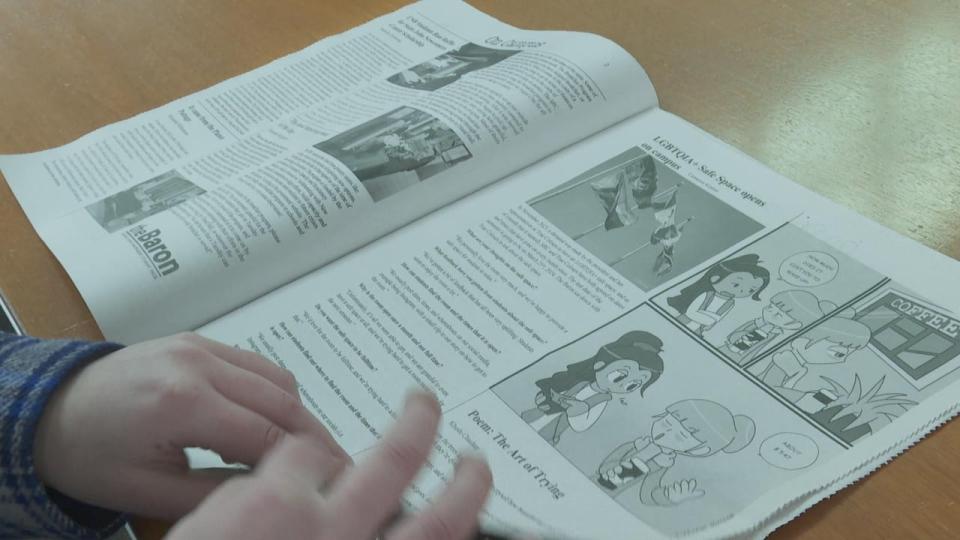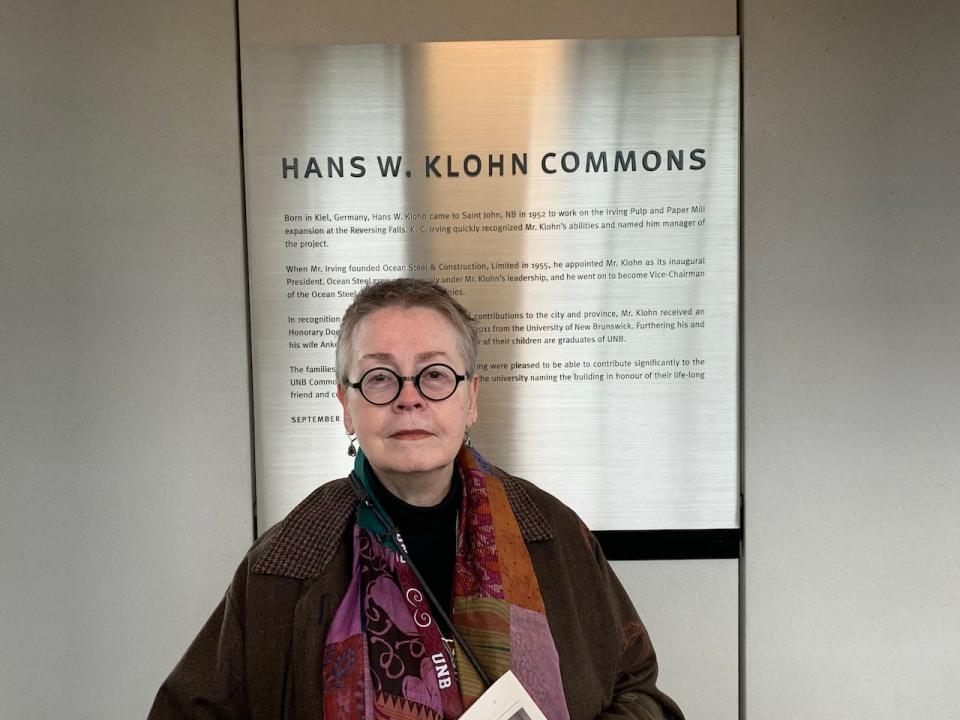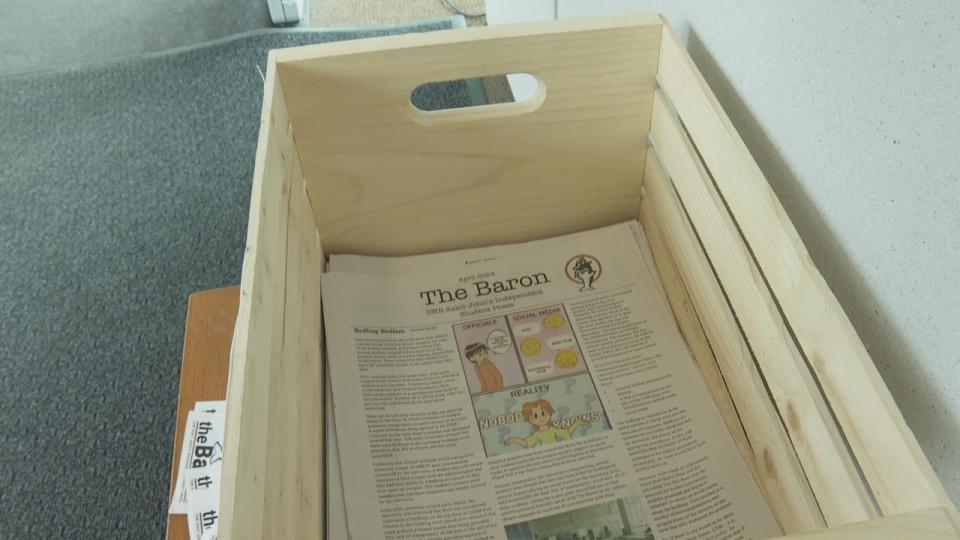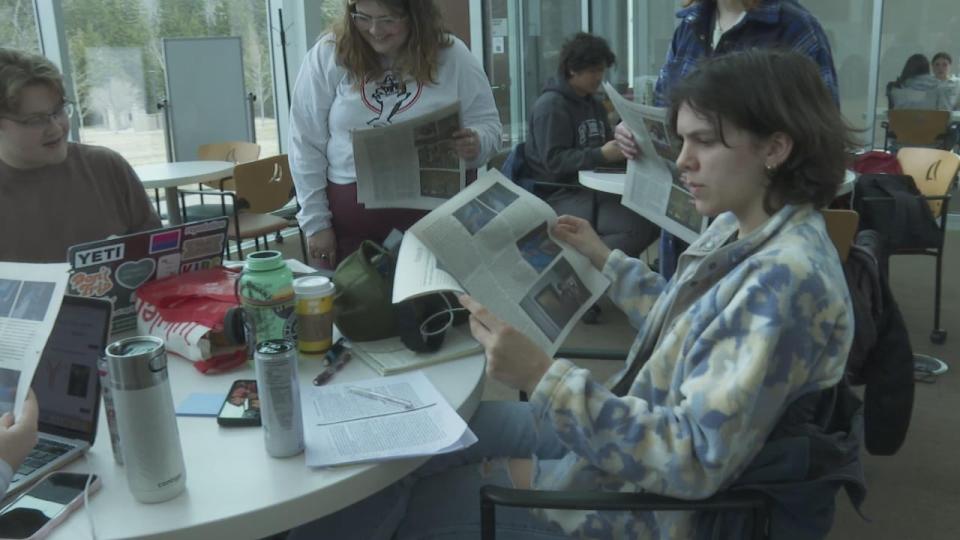Student newspaper at UNB Saint John goes back to the future with print editions

Emily Wheaton, editor-in-chief of the student newspaper The Baron, at the University of New Brunswick in Saint John, came into her role with a mission — to prove the paper's worth to the students on campus.
"It was really important to me to prove to students that they give us $13 a semester for a reason," Wheaton said, referring to the money the paper gets from student fees.
Her goal proved challenging, especially with some social media platforms blocking Canadians from accessing news content in response to the passing of Bill C-18, the Online News Act.
"It was kind of hard to prove that to them without the use of social media because it is such a big part of our lives."

The Baron published its first batch of papers in December at the end of the fall semester and saw its supply of 100 copies go in a week. (Graham Thompson/CBC)
Wheaton found the answer by looking to the past and bringing back the paper in hard copy — the students could actually hold the paper in their hands, something that hadn't been done in a decade.
The first edition in print came out in December, and it was clear they needed to print more.
"We started at 100 and then this publication, our second one, we doubled it to 200 copies because I found there was a need," Wheaton said.
WATCH | 'It kind of brings you back to the good old days a little bit':
The Online News Act, which became law last June, requires digital companies to pay news organizations when someone accesses a digital news story through their platforms as a form of revenue sharing.
In response, Meta blocked news articles and other content being posted by publishers and broadcasters from being viewed or shared by Canadians on their platforms, including those on campus, Wheaton said.
"So before, we would publish daily on our website and then we would post on Meta and Google platforms, and then students would go through those platforms to our website," she said.
"We noticed since we can't post on those platforms anymore, our readership dropped quite a bit."
Google and the federal government reached an agreement in November for Google to continue to share Canadian news online in return for the company making annual payments to news companies.
Nostalgic appeal
Wheaton thought that putting out the newspaper in physical form would bridge a gap, encouraging readership among students and faculty.
"I got nostalgic when I opened the box of papers that came in December and even this month, too. It just reminded me of opening the door at my parents' house when I was a kid and pulling the newspaper in to see what was happening," she said.

Faculty member Miriam Jones says that seeing physical newspapers on campus after a decade made her nostaligic, and she hopes that students see the historical significance of the form. (Nipun Tiwari/CBC)
That feeling is shared by Miriam Jones, chair and associate professor in UNB's humanities and languages department, who was excited to see physical papers again on the campus after so many years.
"I'm enjoying it as a little kind of holiday in the past," she said.
She hopes that students find some value in consuming news in ways they may not be used to.
"It's not just some wood pulp," Jones said. "This is how we communicated for a very long time. This is how people learned anything about what was going on in the world. So it's a significant object."

Wheaton said publishing hard copies of the paper came with some surprises, including how some students reacted. (Graham Thompson/CBC)
One of the courses that Jones teaches is the History of the Book, where she talks about how newspaper use evolved over time.
"I'm referring to things all the time that for our students — they're just theoretical. When was the first newspaper and when did we start to have weekly newspapers? These are all really significant things."
Unexpected results
Wheaton said publishing hard copies of the paper came with some surprises, including how some students reacted.
"The biggest unexpected aspect was that students didn't expect an actual physical paper," she said.
"A lot of them were smelling the paper. They had never held a physical paper before, which I thought was really funny.

Arwen Holder says that physical newspapers make it easier to connect with what's happening on campus. (Graham Thompson/CBC)
Arwen Holder, a third-year student, associates newspapers with trips to see her grandparents. She typically sticks to online sources for information.
She believes the Baron connects students to their campus, and physical newspapers bring information that some may not think to seek out online.
"So what's on campus and what isn't? For UNB, the Baron is the best access to news for campus information ... especially for international students or people that aren't from New Brunswick," she said.
"The physical news copy makes it so much easier to just sort of pick it up and take a look and see what's there."

